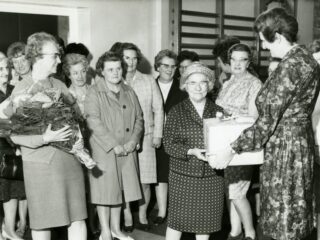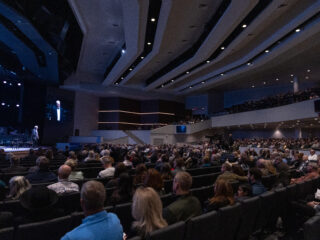Whenever we think about preaching or evangelism in our post-everything world, we seem to romanticize different eras of Christian history. Surely, we think, it would have been easier to preach in the 1950s in North America when America was booming in our post-war enthusiasm. It surely would have been easier, we think, if we’d been a follower of Christ in the first century when the news of the resurrection was the first thing on everyone’s mind.
News flash: it’s never been easy to be a follower of Christ. It wasn’t easy then. It’s not easy now.
Lest we forget, let’s understand that every generation has its challenges. The early church had its challenges and we have ours. Every generation thinks everyone else had it easier than they do. Sit down with any group of pastors and they will tell you that this is the hardest time in history to be a pastor. In some ways, they are right. We do have very unique challenges that no one has faced before. For instance, developments in science, from astronomy to medicine, are making us constantly rethink our theology and understanding of what it means to be human. Pastors have to be very careful in their preaching. Misquote something and someone will have called up the correct quote on their phone before the sermon is finished — and texted you a correction during your sermon. Paul didn’t have to put up with that.
Yet, because things are very different, it doesn’t mean we can’t learn from other generations by studying how they responded to their challenges. How did the early church, more specifically about a hundred and twenty people, reach the Roman Empire with the gospel?
For one thing, they were very generous in their hospitality. Not only did the whole church meet in homes, everything happened in the homes of believers. Worship, fellowship meals, discipleship — even the first seminary (Aquila and Priscilla instructed Apollos) were all done in homes. The connection of friendships and open tables created favorable moments for conversations about Jesus. These days, we think everything has to happen at a “third place” — the church, a local coffee shop, or a restaurant. We rarely invite friends into our homes. We always insist on meeting them somewhere. If we reach this generation, we’ll probably do it the same way we’ve reached every other generation. We’ll have slow and deep — and frequent — conversations with non-believers and seekers in our homes.
Second, the early church studied Jesus. They searched the Scriptures. They debated and prayed. They could trace the line of grace from Eden to Calvary. Have you paid attention to the sermons and letters in the New Testament? Steven preaches the entire Bible to make the case that Jesus is the Messiah. Philip starts from Isaiah and explains to the Ethiopian eunuch about Jesus. Paul pulls quotes from the Psalms and the prophets. Too many of us want to know about the teachings of the world’s great religions. That’s not a bad thing and we certainly should have a basic understanding of other faiths, but when the world comes to us, they want to know what we know about Jesus. No one expects us to be an expert in Hindu or Buddhist teachings. We don’t have to know the details of Islamic teachings.
We should know Jesus and we should know a lot about Jesus. The world counts on us to know all about Jesus and His gospel.
The reason they wanted to know about Jesus was the testimony and witness of changed lives. Why did everyone want to know about Jesus? Because the lame man at the Temple was now standing behind Peter and John. The lame man at the Pool of Siloam is picking up his mat at the command of Jesus. Lazarus, once buried, is now alive. How did that happen? How were their lives changed? The strongest testimony about Jesus is the witness of a life changed by the power of Jesus. There are drunks who don’t drink anymore. There are addicts who are now free from their addiction. Broken marriages have been restored. Our witness is what Christ has done for us that He can also do for you.
Our problem isn’t how hostile our culture is, but how anemic our churches are. When a new baby is born, the parents don’t have to be trained in how to tell their friends the good news. They’ll find a way to get it out. When you know Jesus, when Jesus has changed your life, you’ll know how to tell your neighbors. You’ll invite them over for coffee, or dinner…but you can only do this if you have something to say in the first place.
And all of that begins with an invitation to friendship through hospitality, an open and honest discussion about Jesus and who He is to us, all done with patience and joyful conversation.









